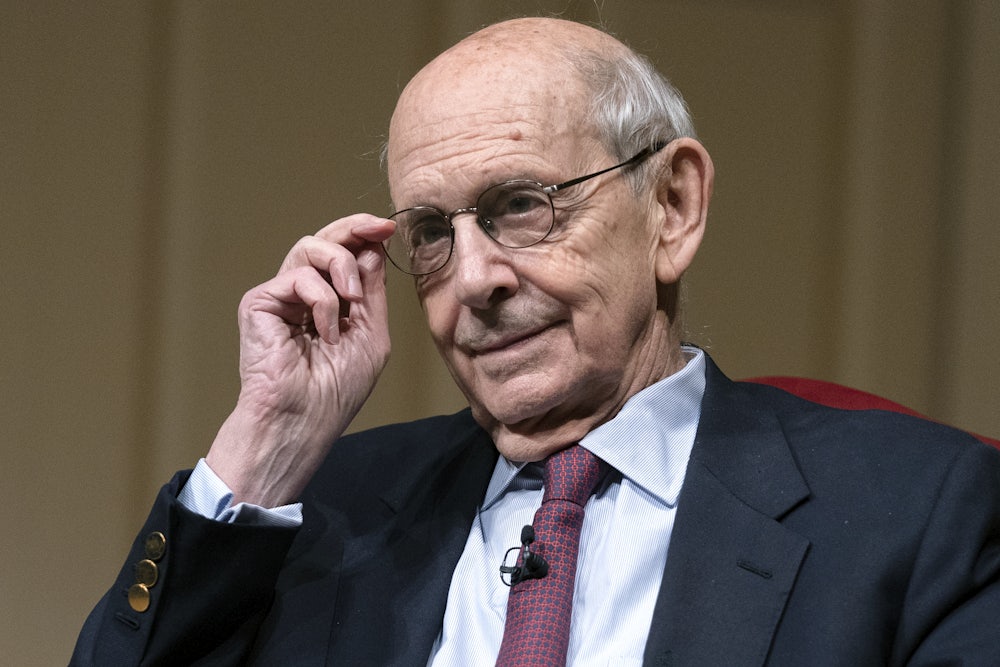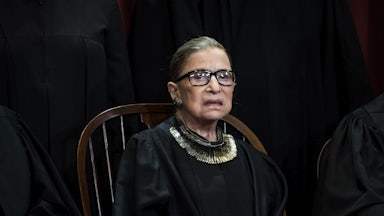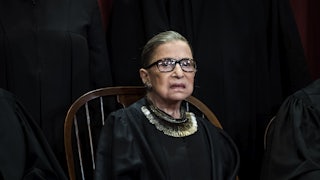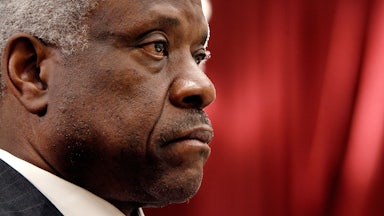In Supreme Court cases where at least one justice disagrees with the majority, three words almost always appear: “I respectfully dissent.” The formulation signals a polite disagreement, one where the justices recognize that different jurists can read the law and the Constitution in different ways and still act in good faith. Collegiality is a virtue to the court for a pragmatic reason: The justices have to work with each other for most, if not all, of the rest of their lives.
So it is notable when any of the justices writes a dissent that simply says, well, “I dissent.” The three liberal justices did just that in Friday’s decision in Dobbs v. Jackson Women’s Health Organization. In their 60-page joint dissent, Justices Stephen Breyer, Sonia Sotomayor, and Elena Kagan do more than just disagree with the majority’s reasoning—they cast the majority’s actions and outcome as illegitimate. It’s quite possible that this idea will be the nucleus of whatever argument eventually recovers the rights lost in Friday’s decision.
“Now a new and bare majority of this Court—acting at practically the first moment possible—overrules Roe and Casey,” the three justices wrote. “It converts a series of dissenting opinions expressing antipathy toward Roe and Casey into a decision greenlighting even total abortion bans. It eliminates a 50-year-old constitutional right that safeguards women’s freedom and equal station. It breaches a core rule-of-law principle, designed to promote constancy in the law. In doing all of that, it places in jeopardy other rights, from contraception to same-sex intimacy and marriage. And finally, it undermines the Court’s legitimacy.”
To outside observers, it is fairly obvious that the Dobbs ruling is the product of changes in the Supreme Court’s membership rather than changes in the law or the facts. Mississippi, the state whose 15-week ban on abortion was at issue in this case, originally disclaimed that it sought to overturn Roe when the court first agreed to hear the case in early 2020—at that time, the court had a 5–4 ideological balance and the somewhat more modestly tempered John Roberts was the median vote. It was only after Ruth Bader Ginsburg’s death and Amy Coney Barrett’s confirmation that the state amended its petition to demand Roe’s overthrow.
Mississippi, in other words, could count to five. And in unusually blunt language, the dissenters stated that this math was the real reason for Friday’s ruling, as well. “The Court reverses course today for one reason and one reason only: because the composition of this Court has changed. Stare decisis, this Court has often said, ‘contributes to the actual and perceived integrity of the judicial process’ by ensuring that decisions are ‘founded in the law rather than in the proclivities of individuals,’” they wrote, quoting past Supreme Court decisions on precedent. “Today, the proclivities of individuals rule.”
The Supreme Court is no stranger to harsh language from dissents, especially in recent years. But it is still striking to see it in a dissent jointly drafted by these particular justices. Breyer, for example, has a reputation both on and off the court for his commitment to personal collegiality, which many of his colleagues highlighted when he announced his retirement earlier this year. Kagan is widely respected among conservatives for her work as dean of Harvard Law School before joining the court; Antonin Scalia even privately urged the Obama White House to nominate her in 2009. Both of those justices signed on to a joint dissent that effectively accuses the majority of reading their personal preferences into the law.
The dissenters and Justice Samuel Alito, who wrote for the majority, sparred over the legal reasoning behind the decision, but almost half-heartedly, as if both sides recognized that there was no real common ground to be found. Alito concluded that the right to obtain an abortion was not “firmly rooted” in the nation’s legal traditions or practices. The dissenters did not really disagree with this point, leading Alito to claim victory. What Alito did not reckon with is their explanation for why no firm roots could be found.
“We referred there to the ‘people’ who ratified the Fourteenth Amendment: What rights did those ‘people’ have in their heads at the time?” the dissenters wrote. “But, of course, ‘people’ did not ratify the Fourteenth Amendment. Men did. So it is perhaps not so surprising that the ratifiers were not perfectly attuned to the importance of reproductive rights for women’s liberty, or for their capacity to participate as equal members of our nation.”
This struck upon an uncomfortable truth about originalism: It insists upon reading the Constitution through the eyes of people who did not think many of their fellow Americans should enjoy the same legal and moral status as them. “Those responsible for the original Constitution, including the Fourteenth Amendment, did not perceive women as equals, and did not recognize women’s rights,” the dissenters wrote. “When the majority says that we must read our foundational charter as viewed at the time of ratification (except that we may also check it against the Dark Ages), it consigns women to second-class citizenship.”
Alito, for his part, insisted that the court’s decision in Dobbs would not upset other rights described by the Supreme Court over the past century, including on contraception and same-sex relationships. It did not help his case that his close ideological ally, Justice Clarence Thomas, simultaneously declared that the court should overturn those precedents in a concurring opinion. But Alito still claimed that the ruling would not imperil Griswold v. Connecticut, Obergefell v. Hodges, or similar rulings on fundamental rights.
How much stock should you take in that pledge? The dissenters, for their part, reacted sarcastically to the idea that the conservative majority would stop with abortion. “Assume the majority is sincere in saying, for whatever reason, that it will go so far and no further,” they wrote. “Scout’s honor. Still, the future significance of today’s opinion will be decided in the future. And law often has a way of evolving without regard to original intentions—a way of actually following where logic leads, rather than tolerating hard-to-explain lines. Rights can expand in that way.”
To that end, they hammered home the importance of the court’s reliance on precedent—and the damage that can be done when it recklessly discards it. “Weakening stare decisis threatens to upend bedrock legal doctrines, far beyond any single decision,” the dissenters explained. “Weakening stare decisis creates profound legal instability. And as Casey recognized, weakening stare decisis in a hotly contested case like this one calls into question this Court’s commitment to legal principle. It makes the Court appear not restrained but aggressive, not modest but grasping. In all those ways, today’s decision takes aim, we fear, at the rule of law.”
Their concern about the court’s legitimacy is one that is likely to grow in the months and years ahead. A Gallup survey released this week found that public support for the Supreme Court had dropped to the lowest level it had ever recorded, with only a quarter of Americans expressing high confidence in the court. That number predated the decision in Dobbs; it is unlikely to grow since two-thirds of Americans also opposed overturning Roe. It’s unlikely this will deter the court from making unpopular reactionary decisions in the future, and there’s still a pile of major decisions that have yet to be released this term.
It’s worth noting that the dissent offers no clear road map to protect or reclaim the rights lost today and threatened tomorrow, at least not where the Supreme Court is concerned. The closest indication came in remarks given last week by Sotomayor to a group of lawyers at the American Constitution Society. She reportedly told the audience to keep faith in the courts, even when they “make mistakes,” and expressed her confidence that the “arc of history” ultimately bends toward justice.
That faint optimism was not present in Friday’s ruling. “In overruling Roe and Casey, this Court betrays its guiding principles,” the liberal justices wrote. “With sorrow—for this Court, but more, for the many millions of American women who have today lost a fundamental constitutional protection—we dissent.”










